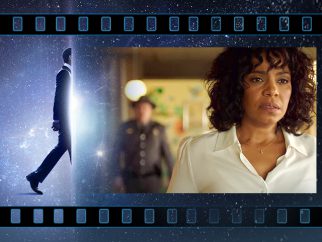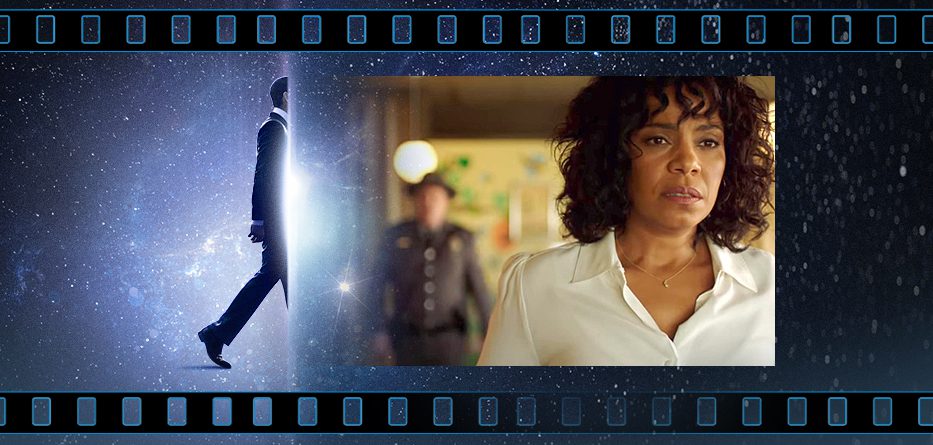Nina (Sanaa Lathan) and her son Dorian (Damsan Idris) are on a drive, taking Dorian to college. Nina escaped a poor and largely prospect-free childhood environment and made a successful legal career for herself and now wants the same – and more – opportunities for her son. Dorian will be studying to be a film-maker and they’ve brought along the old family camcorder to capture their journey. But shortly after stopping at a diner for something to eat, a local sheriff (Glenn Fleshley) enters the establishment and though he’s perfectly friendly with the staff, he later pulls over Nina and Dorian and it’s clear he’s looking for any reason to employ his authority. He’s not happy that Nina appears to be filming the encounter and in the ensuing melee, Nina accidentally hits the rewind button on the device… and the world does just that.
Initially, Nina thinks she’s imagined it all, but when the events start to play out again and again at the flick of a switch, the repercussions increase. Wherever they go and whatever they do after leaving the diner, Lasky turns up to make their lives difficult. When things escalate to tragic proportions, Nina realises that there may be only one way to stop the repeating cycle, but to do that she’ll have to make peace with her own past…
There’s no doubt that while a majority of police-officers are good people doing a hard job – and are worthy of our support and respect – some overt racism and abuse does exist, with individuals wielding their badge, gun and position of power to make lives at best miserable and sometimes outright deadly for the victims of their bigotry and resentment. One of the extremely useful things about the proliferation of handy, modern technology (cameras in our phones, watches, glasses, etc. etc.) is that they are starting to catch out people who do abuse their position. There have been cases where such footage completely changes the views of events and brings people to justice where they might well have escaped it before – whether that be the lens supporting an officer simply doing his job or incriminating him if he does not.
But Replay‘s story about a not-so-humble camcorder – an object that was exciting and cutting-edge only a couple of decades ago and now looks almost chunky and prehistoric and one that here, ultimately, changes a powerful powerplay – might well have benefited from a putting a less overt villain in its sights. The story gives us plenty of sympathetic background on Nina (Sanaa Lathan) and son Dorian (Damsan Idris), two people of colour who have earned everything they have through hard work and determination… but their apparent nemesis, Lasky (Glenn Fleshly is far less fleshed out. Though the episode smartly frames Lasky’s contempt through a gathering mountain of smaller abuses of power, collected as we view his actions through each time-cycle, very little is done to give any insight into the origins or reasons for that behaviour. Few people consider themselves to be so superior, or others to be so inferior, without being able to justify it to themselves – no-one is the villain of their own story – and here Lasky switches from pleasant if clipped social guardian to savage authoritarian in seconds. (So much so that if the episode had revealed him to be a malfunctioning robot, it wouldn’t have been a great surprise). With the exception of a vague revelation about problems with his marital status, Lasky remains simply the relentless boo-hiss boogeyman – one possibly defeated by the end, but neither apologetic nor truly humbled, merely exposed – and that’s far less interesting than it could have been.
An honourable and well intentioned entry, there’s a quiet, understandable anger at work in the screenplay by Selwyn Seyfu Hinds who has said that he deliberately wanted to address the frustrating experiences of too many African Americans. But while he exposes that frustration and lack of balance, he doesn’t offer any real solution or counter-balance… indeed, making all the officers white and malicious / ineffective and making a campus crowd of amateur-vloggers all black, might even be just as guilty of playing to unhelpful stereotypes. (The scenes at the college would have been more powerful if the angry crowd were of all races). That being said, it will particularly resonate with people who have found themselves the victims of so much regular racial profiling and daily prejudice that it’s hard for others to imagine. It actually feels like a story that Doctor Who could have handled if it had added more jokes and whimsy or (particularly) Black Mirror could have tackled with far more acute savagery, both of which could have been just as effective.
An interesting if deliberately polarising story, it’s certainly the best of the new Twilight Zones so far…

- Story9
- Acting9
- Pacing8
- Direction9
- Writing8








